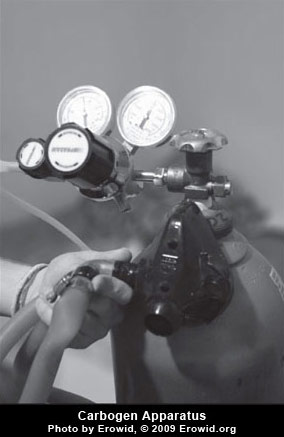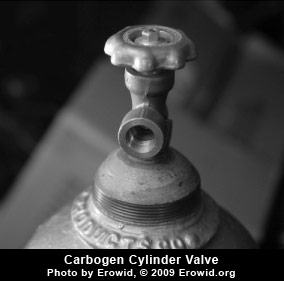Sampling Carbogen
A group trial with CO2/O2 gas
v1.0 - Nov 2009
Citation: Veradeckt. "Sampling Carbogen: A Group Trial with CO2/O2 Gas." Erowid Extracts. Nov 2009;17:6-7.

|
The ratio of 30% CO2 and 70% O2 is known as "Meduna's mixture" and has been used in psychiatric research since the 1940s. It enjoyed a brief period of popularity as a training tool used to test a person's readiness to experience LSD.
Although carbogen--sometimes described in the medical literature as a "panicogen"--is perhaps best known for inducing anxiety, sensations of suffocation, and unconsciousness, this extremely simple gas can cause surprisingly complex psychoactive effects when inhaled for even a few breaths. Some reports of positive, or even glowing, experiences indicate carbogen may be more properly described as a unique psychedelic. This report describes another chapter in carbogen research.
Setting
A small invitation-only gathering that featured carbogen, where guests had the option of trying the gas in a supervised setting. Sessions were conducted in a separate bedroom, with music, soft lighting, and a large sectional sofa that permitted semi-private sessions for individuals, while others at the gathering socialized in the rest of the loft. Nineteen people signed up to have breathing sessions, in the same style of administration as described in "Carbogen Redux: Contemporary Exploration of a Ubiquitous Inhalant", by B. James (Erowid Extracts #12, June 2007). With little precedent for how to design such a gathering, the physical set-up was a bit socially awkward. However, due to the size of the group, this arrangement--rather than having everyone gathered together during administrations--seemed a good choice.Set
Before inviting anyone, the hosts discussed intentions for the tone of the gathering and the effect of suggestibility. Should wording be geared toward the festive, the drug-geeky, or the spiritual? They decided on a neutral, inquisitive, open-to-interpretation description of the event. Some participants arrived already informed about carbogen's history and eager to sample it; others had very little information about it, but were generally curious to try something new. Participants were excited and nervous, or in pleasant spirits. As reports started flowing back to the larger group from those who had already had their sessions, people with anxieties relaxed somewhat. Nevertheless, according to the primary sitter, the average participant had some trepidation going into the experience, because of its novelty, and because of the unusual method of administration. A Mask Over Nose and Mouth
The administration protocol followed the preferences of the person supplying the tank of carbogen. The participant was lying down, with someone seated beside and somewhat above them, holding the mask carefully to their face. The mask was kept in place until the agreed-upon number of breaths had been taken or the participant signaled to stop. This sitter-assisted method of administration may intrude somewhat into the subjective experience, but alternatives have not been documented. One person observed that it would be interesting to experiment with supervised self-administration, which hasn't been described in the literature on carbogen; agreements about number of breaths could be made with a sitter, or a person could be allotted several minutes with the apparatus, and take one or two breaths, or take more, or go to the edge and come back.The final stage of the experience was described as re-entering regular consciousness; some people enjoyed the "disoriented, loopy" reintegration, while others felt that this was the least fun portion of the encounter.
Dosage
The number of breaths taken ranged from 5 to 36; however, as depth of inhalation varies between individuals, dose information cannot be exact. Several participants later in the evening were light-heartedly trying to out-do those who had gone before them, by taking more breaths. Others experimented with sets of breaths--for example, achieving 25 breaths by inhaling 5 breaths, then taking a break to narrate what had happened, then inhaling another 5 breaths, and so on.Effects
As reported previously, and true for this gathering, when carbogen is presented as a powerful but intrinsically neutral or positive experience, it appears to be less likely to produce a negative reaction. Most folks said that the experience had at least some pleasant aspects. A few people felt quite energized after breathing the carbogen--perhaps due to inhaling the higher-than-normal level of oxygen that the mixture provides.

|
One person, who had come to the event for socializing and intended to sit-out the carbogen, changed his mind after hearing people's experiences. He had reservations about breathing a gas that could precipitate the sensation of suffocation, since he had been hospitalized for acute bronchitis as a teen and had nearly died. However, his carbogen session did not revisit the breathing trauma, and went off without complications.
There were two people (not counting those who experienced adverse effects) who, unbidden, said, "I'm not interested in doing this again." They did not have strongly negative experiences, they just found it unremarkable and not worth exploring further. They both had high expectations, which were not met. One of these people may have had high expectations of sensual rapture, after observing another person's ecstatic experience.
Overall, the typical response was neutral to positive, and people reported that they would do it again. Two people had ecstatic experiences and said they would love to repeat the experience.
With one notable exception, no one reported feeling that any part of the experience was terribly difficult. The serious adverse event that did occur was primarily an atypical--and ostensibly dangerous--physical response that required an intervention by a sitter. This serious event gave participants pause, but subsequent breathers had neutral or pleasant experiences.
Two adverse events occurred during this set of carbogen administrations, one was serious and one was not.
Adverse Events
Two adverse events occurred during this set of carbogen administrations, one was serious and one was not. The less serious event involved a participant who had previously suffered from atrial fibrillation (AF) that resolved after surgical intervention; he experienced a reoccurrence of AF after breathing carbogen. He was concerned but not fearful, and the symptoms resolved themselves within a few hours. He recommended that future sitters ask people beforehand if they have a history of atrial fibrillation, as it might be contraindicated for carbogen administration.The second, more serious, adverse event involved a participant who exhibited "seizure-like" flailing and briefly stopped breathing. That participant's experience is covered in detail in Near Death? A Carbogen Experience Gone Awry.
Notes for Future Gatherings
While careful documentation of the sessions was not a primary goal of the gathering's hosts, data-sheets were provided and dutifully filled out by people administering the gas or, in some cases, by the breathers themselves.In hindsight, the hosts concluded it was a bit of fence-sitting to have had this be neither a ceremony, nor an explicit data-gathering event. The power of suggestibility, the short-acting and profound nature of the carbogen high, and the potential for ecstatic experience (without the dependability of pleasure as with nitrous oxide) demanded that a future event be treated with ceremony and greater intention. Such an event would either a) be geared toward data-collection, with a more extensive survey conducive to analysis, or, b) be geared toward supporting transcendent experiences, by having fewer participants, creating a ceremonial setting, having everyone at the gathering attentive for each session, and honing intention (medicine circle style). In any case, the presence of a physician or at least someone recently trained in CPR, in light of the one dangerously atypical response, seems to be important for the comfort of our particular group.
Links #
- Carbogen Logbook 2009 - Notes on individual sessions.


